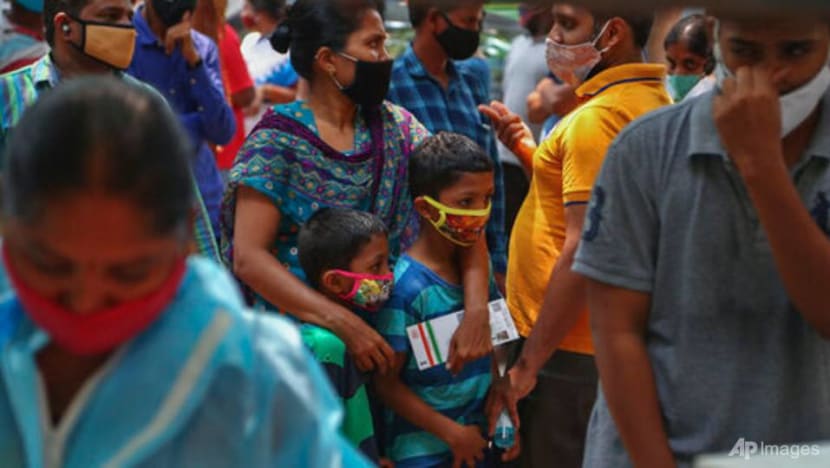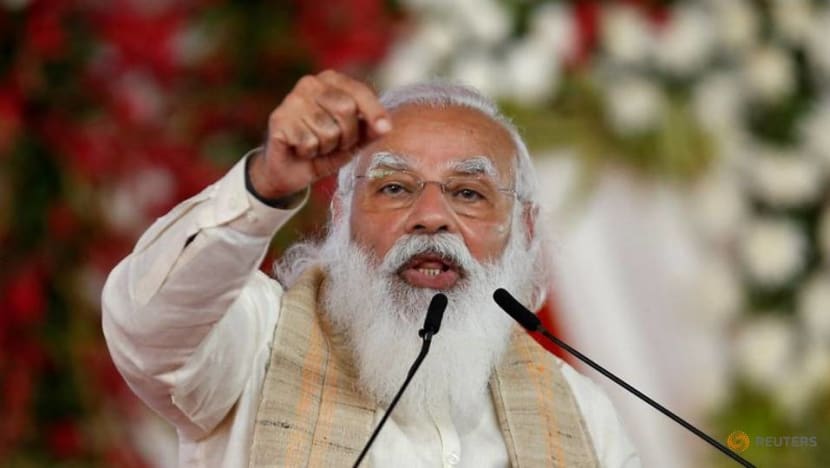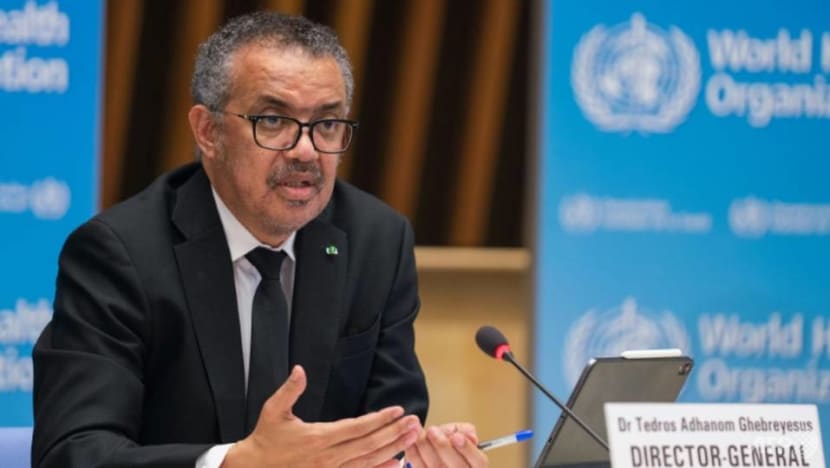commentary Commentary
Commentary: India made distinctive, disastrous errors that led to a COVID-19 crisis
Narendra Modi is not the first world leader to suffer the consequences for acting too slowly – or declaring victory too early, says The Financial Times’ Gideon Rachman.

People wearing masks as a precaution against the coronavirus wait to test for COVID-19 at a government hospital in Hyderabad, India, Sunday, Apr 25, 2021. (Photo: AP/Mahesh Kumar A)
LONDON: “It can be said with pride, India … defeated COVID-19 under the able, sensible, committed and visionary leadership of Prime Minister Modi ... The party unequivocally hails its leadership for introducing India to the world as a proud and victorious nation in the fight against COVID.”
Those were the words of a resolution passed by India’s ruling Bharatiya Janata party, just a few weeks ago in February.
But now India is reeling from a surge in cases. Hospitals are running out of oxygen and acute-care beds. Mass cremations are taking place in makeshift facilities.
Heart-rending pictures of suffering are being broadcast around the world. Surveys of mortuaries suggest that the number of COVID-19 deaths may be two to five times higher than the official figure of around 2,000 a day.
READ: SOS messages, panic as COVID-19 breaks India's health system
READ: Commentary: India had managed to curb COVID-19. That has now changed
The pandemic punishes hubris. Narendra Modi is not the first world leader to have paid the price for acting too slowly – or declaring victory too early.
In China, where the virus originated, Xi Jinping government’s first disastrous reaction was to suppress bad news coming out of Wuhan.
In the US, Donald Trump, then president, repeatedly predicted that the virus would miraculously disappear. In Brazil, President Jair Bolsonaro addressed rallies of anti-lockdown protesters.
In Britain, Prime Minister Boris Johnson locked down the country too late. The EU messed up the purchase of vaccines.

But the Modi government has made some distinctive and disastrous errors. Having called the end of the crisis too early, the Indian government opened up too fast.
FAILURE TO ANTICIPATE SECOND WAVE
Driven by a desire to win the crucial state of West Bengal, the BJP staged mass election rallies. Modi declared himself “elated” by a large crowd that turned out to hear him speak a few days ago, even as COVID-19 cases soared.
The Kumbh Mela, a religious festival that allows millions of pilgrims to converge on a single town, was allowed to go ahead and even promoted by the Hindu nationalist BJP.
The Indian government failed to use the decline in infection after the first wave to prepare properly for a second wave. Emergency oxygen supplies were clearly too low.
Despite the fact that India is the world’s largest producer of vaccines of all sorts, the government was woefully slow to place orders from local manufacturers. It also slowed the approval of proven foreign vaccines for COVID-19, such as the BioNTech/Pfizer jab, while promoting a more experimental Indian-designed vaccine.
READ: Commentary: How COVID-19 vaccines are being weaponised as countries jostle for influence
READ: Commentary: What’s behind India’s generous vaccine diplomacy?
National pride played a part in India’s willingness to keep exporting vaccines, even as domestic supply lagged behind. The Indian government has promoted the idea that the country is the “pharmacy to the world”.
Geopolitical rivalry with China, which is using vaccine diplomacy to win global influence, was a background factor. Delhi’s willingness to export vaccines to the world also contrasted favourably with the lack of exports from the US and UK.
But the Indian government has now banned vaccine exports. It is also speeding up the approval of foreign vaccines.
Modi went into this crisis with sky-high poll ratings, but is clearly vulnerable to a backlash. Having centralised power for many years, he now seems to be shifting the burden of responsibility for dealing with COVID-19 on to state governments.
COVID-19 AN INTERNATIONAL FIRE
India’s plight has worldwide implications. There is still a tendency in the west to treat the pandemic as a series of national crises in which countries compete to see who can deal with the virus better.

READ: Commentary: Japan’s slow-mo vaccination programme has a lot riding on it
But this is an interconnected global crisis. As Tedros Adhanom Ghebreyesus, the head of the World Health Organization puts it, COVID-19 is an international fire and, “if you hose only one part of it, the rest will keep burning”.
Eventually, the fire is likely to spread once again, reigniting in places where it was thought to be extinguished.
There is already cause for concern that the UK was too slow to introduce stringent quarantine measures for passengers arriving from India. That is particularly dangerous, given the emergence of new variants of the virus in India that may be more transmissible and vaccine resistant.
Getting medical help to India is now both a humanitarian and a pragmatic necessity for the outside world, which is beginning to respond. For the US, it may also be a geopolitical necessity, given that America regards India as a crucial ally in its growing rivalry with China.
READ: Commentary: Why many under 45 are hoping vaccination slots open in June
READ: Commentary: Why is Asia slow to get vaccinated?
The Biden administration’s refusal, so far, to allow the emergency export of vaccines to India is feeding anti-American sentiment in the country, which may not be offset by airlifts of ventilators and other equipment.
The outside world should also guard against the kind of complacency that was prevalent in India until recently. The fact that case numbers are falling and vaccination rates are rising in Britain could easily create a dangerous relaxation, similar to the one that India went through a couple of months ago.
A recent article in The Times proclaimed that “Britain could feel like paradise this summer.”
The lesson of India is to guard against premature celebration or hubris. Any improvement in the coronavirus situation should be used as an opportunity to prepare for future waves and to help the international fight against the pandemic.
India will not be the last country to witness a tragic resurgence of COVID-19.
(Listen to healthcare experts discuss the behind-the-scenes considerations going into what might be Singapore’s biggest vaccination programme ever on CNA's Heart of the Matter podcast:)
BOOKMARK THIS: Our comprehensive coverage of the coronavirus outbreak and its developments
Download our app or subscribe to our Telegram channel for the latest updates on the coronavirus outbreak: https://cna.asia/telegram










